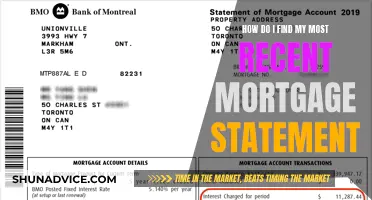
If you're looking to pay off your mortgage, it's important to know that the payoff amount is not the same as your current balance. The payoff amount is the remaining amount you need to pay on your mortgage, including interest. This can be calculated using a mortgage payoff calculator, which will help you evaluate different mortgage payoff options, including making one-time or periodic extra payments, biweekly repayments, or paying off the mortgage in full. To calculate your mortgage payoff, you'll need to know the total amount borrowed, your annual interest rate, the total number of payments for the whole duration of the loan, and the total number of payments remaining. It's also important to be aware of any prepayment penalties that your mortgage lender may charge for paying off your mortgage early.
| Characteristics | Values |
|---|---|
| Definition | The payoff amount is the remaining amount you need to pay on your mortgage, including interest. |
| Calculation | The payoff amount can be calculated using a mortgage payoff calculator or manually using the total amount borrowed, the annual interest rate, the total number of payments for the whole duration of the loan, and the total number of payments remaining. |
| Factors Affecting Payoff Amount | The payoff amount may include interest, fees, and penalties for early repayment. |
| Sources for Payoff Amount Information | The payoff amount can be requested from the lender or servicer or calculated using online tools and calculators. |
What You'll Learn

Calculating your mortgage payoff amount
To calculate your mortgage payoff, you will need to know the following:
- The total amount borrowed when you took out the loan.
- Your annual interest rate.
- The total number of payments for the whole duration of the loan.
- The total number of payments remaining.
You can calculate your payoff amount by using an online mortgage payoff calculator. These calculators will help you evaluate different mortgage payoff options, including making one-time or periodic extra payments, biweekly repayments, or paying off the mortgage in full. They will also calculate the remaining time to pay off the loan, the difference in payoff time, and interest savings for different payoff options.
Alternatively, you can calculate your mortgage payoff amount manually. To do this, you will need to divide your annual interest rate by twelve, as mortgage interest compounds monthly. Then, you must calculate the interest accrual since your last payment and add this to your balance. This process is known as paying in arrears, where you pay, for example, June's interest with July's payment.
It is important to note that your payoff amount may include other fees, such as prepayment penalties, government recording fees, and lien release fees. These fees should be outlined in your loan documents. By calculating your mortgage payoff amount, you can take control of your finances and work towards fully owning your home.
Finding Non-Recourse Mortgages: What You Need to Know
You may want to see also

Using a mortgage payoff calculator
A mortgage payoff calculator is a useful tool for homeowners who want to pay off their mortgage early and save on interest. The calculator will help you evaluate your options, including making one-time or periodic extra payments, bi-weekly payments, or paying off the mortgage in full.
To use a mortgage payoff calculator, you will need to input information about your loan, such as the remaining balance, interest rate, and monthly payment values. This information can typically be found in your monthly or quarterly mortgage statement. The calculator will then help you understand how increasing your monthly payment can shorten your mortgage term and reduce the amount of interest you pay over the life of the loan.
For example, let's say you have a remaining balance of $200,000 on your home. Your current principal and interest payment is $993 every month on a 30-year fixed-rate loan. If you decide to make an additional $300 payment towards the principal every month to pay off your home faster, you will save over $64,000 in interest and pay off your home 11 years sooner.
It is important to note that some mortgages have prepayment penalties, so be sure to check with your lender before making any extra payments. Additionally, keep in mind that your monthly payment may include other costs such as homeowners' insurance, property taxes, and private mortgage insurance (PMI).
By using a mortgage payoff calculator, you can make informed decisions about your loan and develop a strategy to pay off your mortgage early, saving you thousands of dollars in interest.
Understanding Your Mortgage Grace Period: What You Need to Know
You may want to see also

Prepayment penalties
A prepayment penalty is a fee charged by some lenders when a borrower pays off all or part of their mortgage before the loan term ends. This typically only happens within the first three years of committing to the loan, and the fee is usually a percentage of the remaining mortgage balance or a certain number of months' worth of interest. Prepayment penalties are written into mortgage contracts to protect lenders from losing interest income.
If you are unsure whether your mortgage has a prepayment penalty, check with your lender. It is important to understand the circumstances under which you will be charged a fee and how much it will cost. You may be able to negotiate with your lender to remove or reduce prepayment penalties before finalising your loan.
Locating Your HSBC Mortgage Account: A Quick Guide
You may want to see also

How to request a payoff amount
To request a payoff amount, you will need to contact your loan servicer. The payoff amount will include the total amount you owe, as well as any interest and fees associated with the payoff. It is important to note that the payoff amount may differ from your current loan balance.
You can generally request a payoff statement from your servicer, who will then prepare and send you the statement within seven business days. This statement will include the total amount you owe, the date that the amount is valid through, and instructions on how to make the payment. However, there may be exceptions to the seven-day deadline, such as in cases of bankruptcy, foreclosure, or natural disaster.
If you do not receive the payoff statement within an appropriate timeframe, you can send your servicer a written complaint, called a "notice of error". This should include a description of the error, such as the servicer's failure to provide a payoff statement or disputing the accuracy of the amount. Federal mortgage servicing regulations require the servicer to correct any errors within seven days, excluding weekends and holidays.
It is also important to be aware of any penalties or fees associated with paying off your mortgage loan early. By examining your loan agreement, you can understand the terms of your loan and any potential prepayment penalties. Additionally, if you are selling your home or refinancing, you may need to request an updated quote if the payoff is not completed by the specified date.
Finding Mortgage Records: A Comprehensive Guide
You may want to see also

The benefits of paying off your mortgage early
To find out your mortgage payoff amount, you can use an online mortgage payoff calculator. Alternatively, you can contact your bank to obtain a payoff quote. Note that the payoff amount is generally higher than the remaining balance on the home, as it includes interest and fees.
Now, here are the benefits of paying off your mortgage early:
Peace of Mind
For many people, the peace of mind that comes with paying off a mortgage early is the number one reason to do so. This sense of accomplishment and reduced financial stress can improve your mental well-being.
Increased Home Equity
When you pay off your mortgage, you fully own your home, increasing your net worth and providing financial security.
Improved Cash Flow
Without monthly mortgage payments, you will have more disposable income to invest, save, or spend as you choose. This can be especially beneficial if you are not good at managing your money or refraining from spending what you have.
Reduced Financial Risk
Paying off your mortgage early reduces the risk of foreclosure and can provide financial flexibility during economic downturns or personal financial crises.
Retirement Planning
Entering retirement without a mortgage can significantly lower your living expenses, making it easier to manage on a fixed income.
Finding Your NatWest Mortgage Account Number: A Guide
You may want to see also
Frequently asked questions
You can find out your mortgage payoff amount by using an online calculator. You will need to know the total amount borrowed, your annual interest rate, the total number of payments for the whole duration of the loan, and the total number of payments remaining.
Your payoff amount includes the payment of any interest due through the day you intend to pay off your loan. It may also include other fees you have been charged and not yet paid. This means that your payoff amount will be higher than your current balance.
A prepayment penalty is a fee that can be charged if your mortgage is paid off early. Many mortgage loans do not have prepayment penalties, but it is important to check with your lender if you are unsure.
You can save money on your mortgage by paying extra toward your loan's principal each month, every year, or in a one-time payment. This will reduce the amount of your loan and save you money on interest.
The principal is the amount borrowed, while the interest is the lender's charge to borrow the money. This interest charge is typically a percentage of the outstanding principal.







